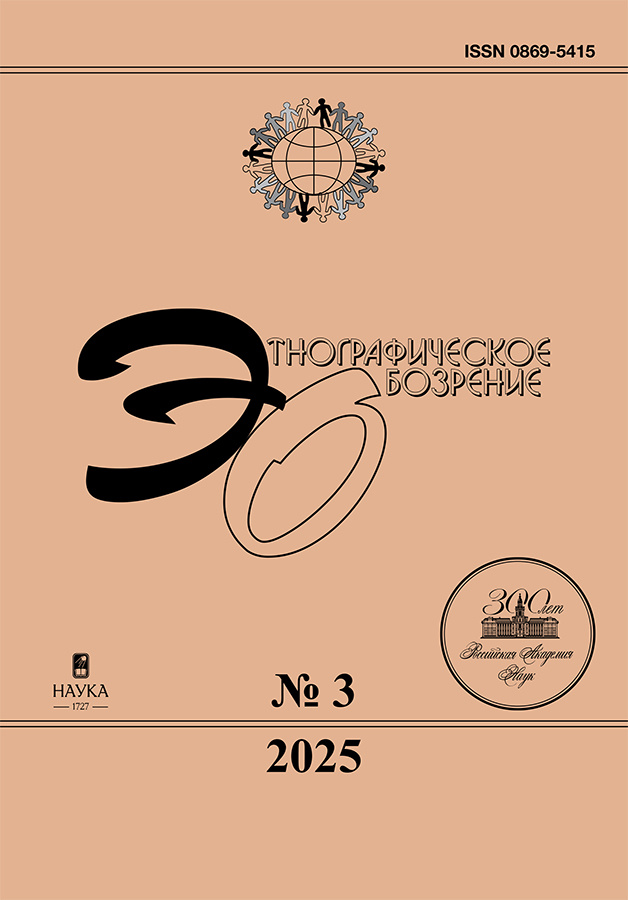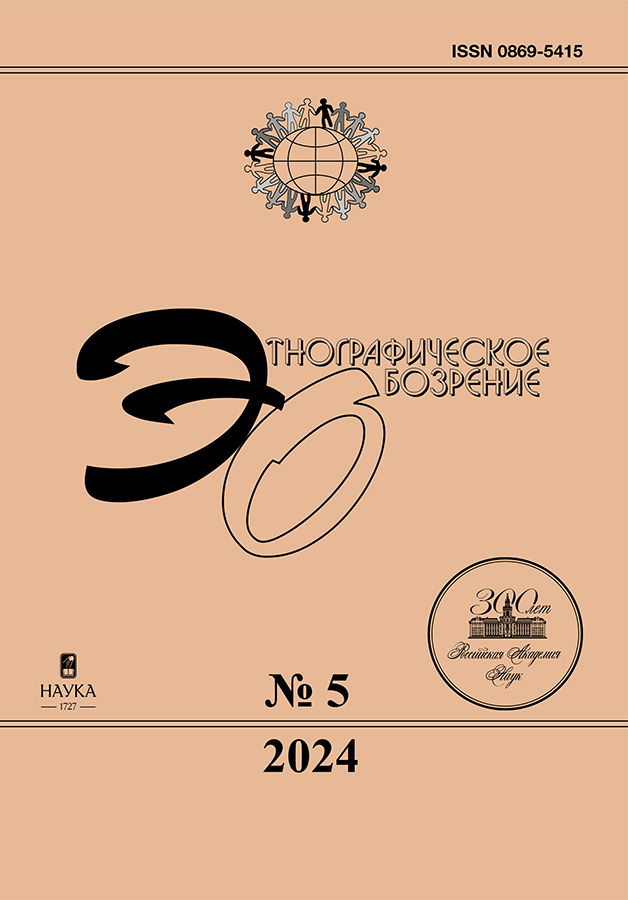Students on the “Web”: Social Media as an Actor in Assembling “Network Spaces” of Educational Migrants in Irkutsk
- Authors: lIvanov K.1, Koreshkova I.1
-
Affiliations:
- Irkutsk State University
- Issue: No 5 (2024)
- Pages: 136-156
- Section: Migration Studies
- URL: https://cijournal.ru/0869-5415/article/view/672420
- DOI: https://doi.org/10.31857/S0869541524050087
- EDN: https://elibrary.ru/ASBGHO
- ID: 672420
Cite item
Abstract
The article studies daily online and offline practices by trans-local (Russian) and transnational (Chinese) student migrants in Irkutsk. Drawing on the concept proposed by J. Law, distinguishing between “Euclidean space” and “Network space”, we aimed to explain how migrant students’ participation in various digital chats and groups shapes and stabilizes different networks, determining their everyday practices. We demonstrate that for Chinese students, participation in social media groups becomes the foundation for forming their “Network space”, playing a primary role in its assembly. For Russians, however, social media mainly supplement offline practices, supporting building the “Network space”. Thus, while physically present in the same locations (“Euclidean space”) daily, trans-local (Russian) and transnational (Chinese) students perceive them differently as they simultaneously exist in various “Network spaces”, including those influenced by digital resources.
Full Text
About the authors
Kiril lIvanov
Irkutsk State University
Author for correspondence.
Email: ivanov-ka@word.isu.ru
ORCID iD: 0000-0002-3895-0082
старший преподаватель кафедры китаеведения
Russian Federation, 1 Karl Marx Str., Irkutsk, 664003Iuliia Koreshkova
Irkutsk State University
Email: yuliakodzhaeva@yandex.ru
младший научный сотрудник научно-исследовательской части
Russian Federation, 1 Karl Marx Str., Irkutsk, 664003References
- Amigo, B., F. Osorio, and M.C. Bravo. 2017. Mobile Communication Technologies and Ontological Security. Convergencia Revista de Ciencias Sociales 74: 39–61.
- Avdashkin, A.A. 2022. Kyrgyzskaia kiberdiaspora: postanovka problemy i vzgliad migrantov [Kyrgyz Cyber-Diaspora: Problem Statement and Migrants’ Perspectives]. Etnograficheskoe obozrenie 5: 114–130.
- Bailey, F.J., and J. Dua. 1999. Individualism–Collectivism, Coping Styles, and Stress in International and Anglo‐Australian Students: A Comparative Study. Australian Psychologist 34: 177–182. https://doi.org/10.1080/00050069908257451
- Bjørnholt, M., and G. Farstad. 2012 “Am I Rambling?” On the Advantages of Interviewing Couples Together. Qualitative Research 14 (1): 1–17.
- Bryazgina, D.E. 2020. “Etnicheskie” rynki Irkutska: proizvodstvo i transformatsiia sotsial’nogo prostranstva goroda [The “Ethnic” Markets of Irkutsk: Production and Transformation of Urban Social Space]. Laboratorium: zhurnal sotsial’nykh issledovanii 3: 70–99. https://doi.org/10.25285/2078–1938–2020–12–3–70–99
- Dyatlova, E.V. 2017. Kitaiskii obshchepit v Irkutske [Chinese Catering in Irkutsk]. Proekt Baikal 54: 82–85. https://doi.org/10.7480/projectbaikal.54.1254
- Falk, S., A. Römmele, and M. Silverman. 2017. Digital Government: Leveraging Innovation to Improve Public Sector Performance and Outcomes for Citizens. Berlin: Springer.
- Filippov, A.F. 2008. Sotsiologiia prostranstva [Sociology of Space]. St. Petersburg: Vladimir Dal’.
- Galchenko, I., and F.J. Van De Vijver. 2007. The Role of Perceived Cultural Distance in the Acculturation of Exchange Students in Russia. International Journal of Intercultural Relations 2: 181–197. https://doi.org/10.1016/j.ijintrel.2006.03.004
- Goodman, M., D. Goodman, and M. Redclift. 2010. Consuming Space: Placing Consumption in Perspective. Farnham: Ashgate Publishing Limited.
- Granovetter, M.S. 1973. The Strength of Weak Ties. American Journal of Psychology 6: 1360–1380.
- Grigorichev, K. 2018. Restructuring of the Chineseness: Ethnic Marking of City Spaces in the Light of Migration from China. Journal of Siberian Federal University. Humanities & Social Sciences 11: 1762–1775. https://doi.org/10.17516/1997-1370-0338
- Grigorichev, K., and I. Koreshkova. 2022. “Chinese” or “Local”?: The Heterogeneous Identity of the Agrarian Assemblage in the Siberian Suburbs. Inner Asia 1: 31–52. https://doi.org/10.1163/22105018–02302016
- Haleem, A., M. Javaid, M.A. Qadri, and R. Suman. 2022. Understanding the Role of Digital Technologies in Education: A Review. Sustainable Operations and Computers 3: 275–285.
- Haynes, N., and X. Wang. 2019. Making Migrant Identities on Social Media: A Tale of Two Neoliberal Cities on the Pacific Rim. Media, Culture & Society 1: 1–10. https://doi.org/10.1177/0163443719884060
- Hilbert, M. 2020. Digital Technology and Social Change: The Digital Transformation of Society from a Historical Perspective. Dialogues in Clinical Neuroscience 22 (2): 189–194.
- Hofstede, G. 1987. The Applicability of McGregor’s Theories in South East Asia. Journal of Management Development 6 (3): 9–18.
- Hurh, W.M., and K.C. Kim. 1990. Adaptation Stages and Mental Health of Korean Male Immigrants in the United States. International Migration Review 24 (3): 456–479.
- Ju, R., L. Hamilton, and M. McLarnon. 2021. The Medium is the Message: Wechat, Youtube, and Facebook Usage and Acculturation Outcomes. International Journal of Communication 15: 4011–4033. https://doi.org/1932-8036/20210005
- Kolova, S.M., and O.V. Belkina. 2023. Sociocultural Support of Internationl Students as Adaptation Tool in Intercultural Environment of Russian University (SUSU Case Study). Bulletin of the South Ural State University: Education; Educational Sciences 3: 67–83. https://doi.org/10.14529/ped230306
- Koreshkova, Y.O. 2018. Wechat as a Lifestyle: Social Network Tool of the Chinese Migrants in Russia. Journal of Siberian Federal University. Humanities & Social Sciences 11: 1816–1823. https://doi.org/10.17516/1997-1370-0342
- Kuzheleva-Sagan, I., et al. 2016. “Tsifrovye diaspory” migrantov iz Tsentral’noi Azii: virtual’naia setevaia organizatsiia, diskurs “voobrazhaemogo soobshchestva” i konkurentsiia identichnostei [“Digital Diasporas” of Migrants from Central Asia: Virtual Network Organization, Discourse of “Imagined Community” and Competition of Identities]. Tomsk: Izdatel’stvo TGU.
- Latour, B. 2014. Peresborka sotsial’nogo: vvedenie v aktorno-setevuiu teoriiu [Reassembling the Social: An Introduction to Actor-Network-Theory]. Moscow: Izdatel’skii dom VShE.
- Law, J. 2002. Objects and Spaces. Theory, Culture & Society 5: 91–105. https://doi.org/ 10.1177/026327602761899165
- Lee, J.W.Y., B. Kim, T.L. Lee, and M.S. Kim. 2012. Uncovering the Use of Facebook During an Exchange Program. China Media Research 4: 62–76.
- Mallinson, K. 2015. Smartphone Revolution: Technology Patenting and Licensing Fosters Innovation, Market Entry, and Exceptional Growth. IEEEConsumer Electronics Magazine 4 (2): 60–66. https://doi.org/10.1109/MCE.2015.2392954
- Mavhandu-Mudzusi, A.H. 2018. The Couple Interview as a Method of Collecting Data in Interpretative Phenomenological Analysis Studies. International Journal of Qualitative Methods 17 (1). https://doi.org/10.1177/1609406917750994
- Peng, Y. 2016. Student Migration and Polymedia: Mainland Chinese Students’ Communication Media Use in Hong Kong. Journal of Ethnic and Migration Studies 14: 2395–2412. http://doi.org/10.1080/1369183X.2016.1194743
- Ryzhova, N., and I. Koreshkova. 2022. Wechat as Migration Infrastructure: The Case of Chinese-Russian Precarious Labour Markets. In WeChat and the Chinese Diaspora, edited by W. Sun and H. Yu, 38–56. Milton Park: Routledge.
- Sinanan, J., and C. Gomes. 2020. “Everybody Needs Friends”: Emotions, Social Networks and Digital Media in the Friendships of International Students. International Journal of Cultural Studies 5: 674–691. https://doi.org/ 10.1177/1367877920922249
- Smetanin, F.A., D.O. Timoshkin, K.A. Ivanov, and D.E. Bryazgina. 2023. Ishchu kvartiru, rabotu, shamana: sotsial’nye media kak mekhanizm strukturnoi adaptatsii vnutrennikh migrantov v Sibiri [Searching for an Apartment, Job, Shaman: Social Media as a Mechanism of Structural Adaptation for Internal Migrants in Siberia]. Vestnik Tomskogo gosudarstvennogo universiteta. Istoriia 83: 157–166.
- Timoshkin, D. 2020. Construction of Horizontal Networks on “Migrant” Russian-Language Digital Platforms. Journal of Siberian Federal University. Humanities & Social Sciences 13 (5): 688–699.
- Timoshkin, D.O., et al. 2023. Sotsial’nye media kak mekhanizm (vos)proizvodstva migratsionnykh strategii (na primere tsifrovykh ploshchadok russkoiazychnykh migrantov v Koree) [Social Media as a Mechanism of (Re)production of Migration Strategies (Using the Example of Digital Migration Platforms in Korea)]. Sotsiologicheskii zhurnal 29 (2): 25–50.
- Valentine, G. 1999. Doing Household Research: Interviewing Couples Together and Apart. Area 31 (1): 67–74.
- Xia, L., S. Baghaie, and S. Mohammad Sajadi. 2024. The Digital Economy: Challenges and Opportunities in the New Era of Technology and Electronic Communications. Ain Shams Engineering Journal 15 (2). https://doi.org/10.1016/j.asej.2023.102411
- Yan, Y. 2018. Facebook and Wechat: Chinese International Students’ Social Media Usage and How It Influences Their Process of Intercultural Adaptation. PhD diss., Marquette University.
- Yang, C. 2018. US-Based Social Media Use and American Life: A Study of Chinese Students’ Acculturation and Adaptation in America. Global Media and China 2: 75–91. https://doi.org/10.1177/2059436418783765
- Ye, J. 2006. Traditional and Online Support Networks in the Cross-Cultural Adaptation of Chinese International Students in the United States. Journal of Computer-Mediated Communication 3: 863–876. http://doi.org/10.1111/j.1083-6101.2006.00039.x
- Yu, Q., P. Foroudi, and S. Gupta. 2019. Far Apart Yet Close by: Social Media and Acculturation Among International Students in the UK. Technological Forecasting and Social Change 145: 493–502.
Supplementary files

Note
*Экстремистская организация, запрещенная на территории РФ.












